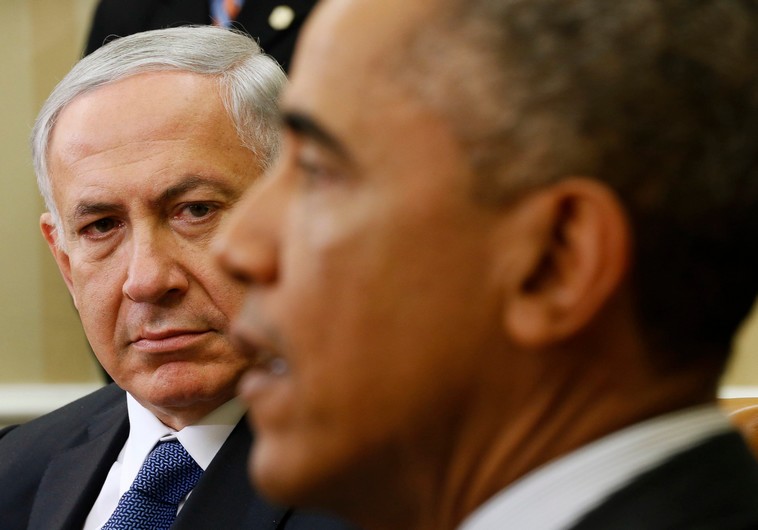US acknowledges withholding information from Israel on Iran talks
By MICHAEL WILNER, HERB KEINON/J.Post/02/18/2015
Accusing Israeli officials of “selective sharing of information” and “cherry picking” in their public complaints over the diplomatic effort, US spokesmen said they are continuing “routine and frequent” contact with the Israelis.
But “not everything you’re hearing from the Israeli government is an accurate depiction of the talks,” State Department spokeswoman Jen Psaki said. And for that reason, “classified negotiating details stay behind closed doors.”
Those comments from the Obama administration came on the same day The New York Times ran a report alleging Washington had warned its European partners in the P5+1 not to be too open with Israel, “because whatever we say may be used in a selective way.” The P5+1 is made up of the US, Russia, China, France, Germany and Britain.
One Israeli official responded by echoing an earlier comment by Prime Minister Benjamin Netanyahu, saying that if the deal being negotiated was a good one, why was there a need to hide details.
The Times report dovetailed with one earlier in the week in The Washington Post, which said US officials are angry about alleged Israeli leaks that, in the negotiations, the US had increased the number of centrifuges it would allow Iran to retain from some 1,500 to more than 6,000.
Yet Psaki and her colleague at the White House, press secretary Josh Earnest, said their decision to withhold information from Israel is not new.
“Obviously, we work to protect sensitive information in the negotiations,” Psaki continued. Asked pointedly whether the US is withholding information from inside the talks from the Israelis, she said, “Correct.”
Washington’s acknowledgment of a gap in its briefings to Israel highlights growing space between the allies on the emerging agreement with Iran, aggressively sought by US President Barack Obama and opposed with equal vigor by Netanyahu.
Yet, despite the revelation, Israel still knows the details of the emerging deal, the prime minister said earlier on Wednesday.
“While Islamic State butchers the innocent, the Islamic Republic of Iran is relentlessly pursuing nuclear weapons with the express purpose of destroying the State of Israel,” Netanyahu said at the outset of a meeting with freshman Republican Sen. David Perdue of Georgia.
Netanyahu repeated Israel’s position that the world powers’ latest proposals to the Iranians would not halt their nuclear march.
“The Iranians, of course, know the details of that proposal, and Israel does, too,” he said. “So when we say that the current proposal would lead to a bad deal, a dangerous deal, we know what we’re talking about, senator. I’m open to hearing the positions and arguments of those who think differently, and I would hope that they would be open to hear the arguments of Israel as well.”
The Times and Washington Post reports both hinted at a certain disingenuousness of the supposed leaks, which on the surface would indicate that the Iranians would be able to retain a large portion of their nuclear infrastructure.
For instance, the Times quoted an American official as saying the number of centrifuges only tells part of the story. “What they don’t tell you is that we only let them have that many centrifuges if they ship most of their fuel out of the country,” the official said.
One Israeli official responded to the charge that Israel was “cherry- picking” the information, by saying that “we see no way that 6,000 or 7,000 centrifuges can be okay, irrespective of other elements in the package.”
The official, phrasing his comments very carefully, said that “in the past we understood from our interlocutors from the P5+1 that the goal of the negotiation was that Iran would be kept years away from a breakout capacity.”
Then, he said, that time period was change to “more than a year.”
“What we understand now is that today they are talking about a year,” he said. “If true, that is a very problematic dynamic.”
Asked how Israel could know the details of the accord if it is not been given all the information, the official said, “We cover Iran very closely.” He did not elaborate.
Up until Wednesday, both US and Israeli officials on the record have denied that there has been any reduction in the cooperation and coordination between the two sides.
With that, though, high-level officials on both sides have acknowledged concern that the exchange of information will not be as good as in the past, for fear that the information shared might be used by the other side to pursue its own political agenda: with Israel using the information it gets from the negotiators to lobby against the deal, and the US using intelligence information provided by Israel to push the agreement forward.
Nevertheless, the high-level meetings between the US and Israeli officials on Iran continue, with National Security Council head Yossi Cohen currently in Washington for planned meetings with his White House counterpart, Susan Rice, and the State Department’s top Iranian negotiator, Wendy Sherman.
US Ambassador to Israel Dan Shapiro said on Tuesday that Israel and the US continue to have shared interests in preventing Tehran from acquiring nuclear weapons.
“The US is determined to prevent it, and will,” he said during a speech in Tel Aviv. “Our cooperation and consultation with Israel on this shared goal continues, even at moments when we may disagree on one or another aspect of this approach.”
In a related development, two polls published in the US media showed widely disparate positions on whether the US public was for or against Netanyahu speaking next month in Congress against the Iranian nuclear threat.
While the headline on CNN’s website of a poll it conducted on this matter read, “Majority of Americans oppose Netanyahu invite,” Bloomberg headlined its story on a poll commissioned by The Israel Project with the following: “Poll Shows Americans Want Netanyahu to Speak.”
The CNN/ORC poll asked whether congressional leaders did the right or wrong thing inviting the prime minister, and found that 33 percent said they did the right thing, and 63% the wrong thing.
The Israel Project poll – conducted by Paragon Insights – found, on the other hand, that 43% agreed with the statement that Netanyahu, as one of the world’s most knowledgeable leaders on the Middle East, should address Congress, and 25% agreed that it was inappropriate for him to give the speech only two weeks before the Israeli election.















